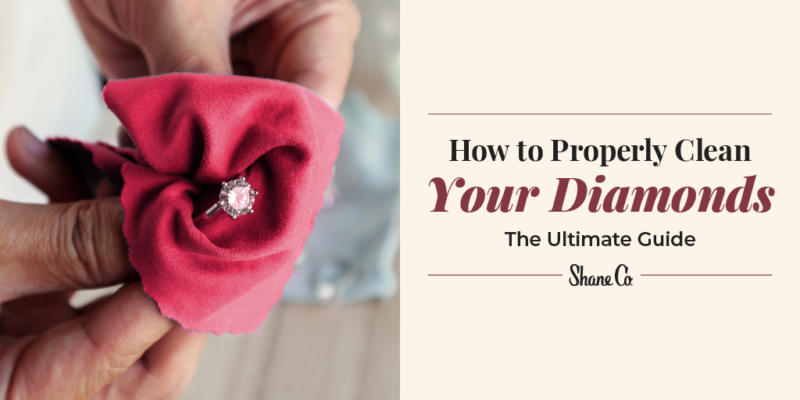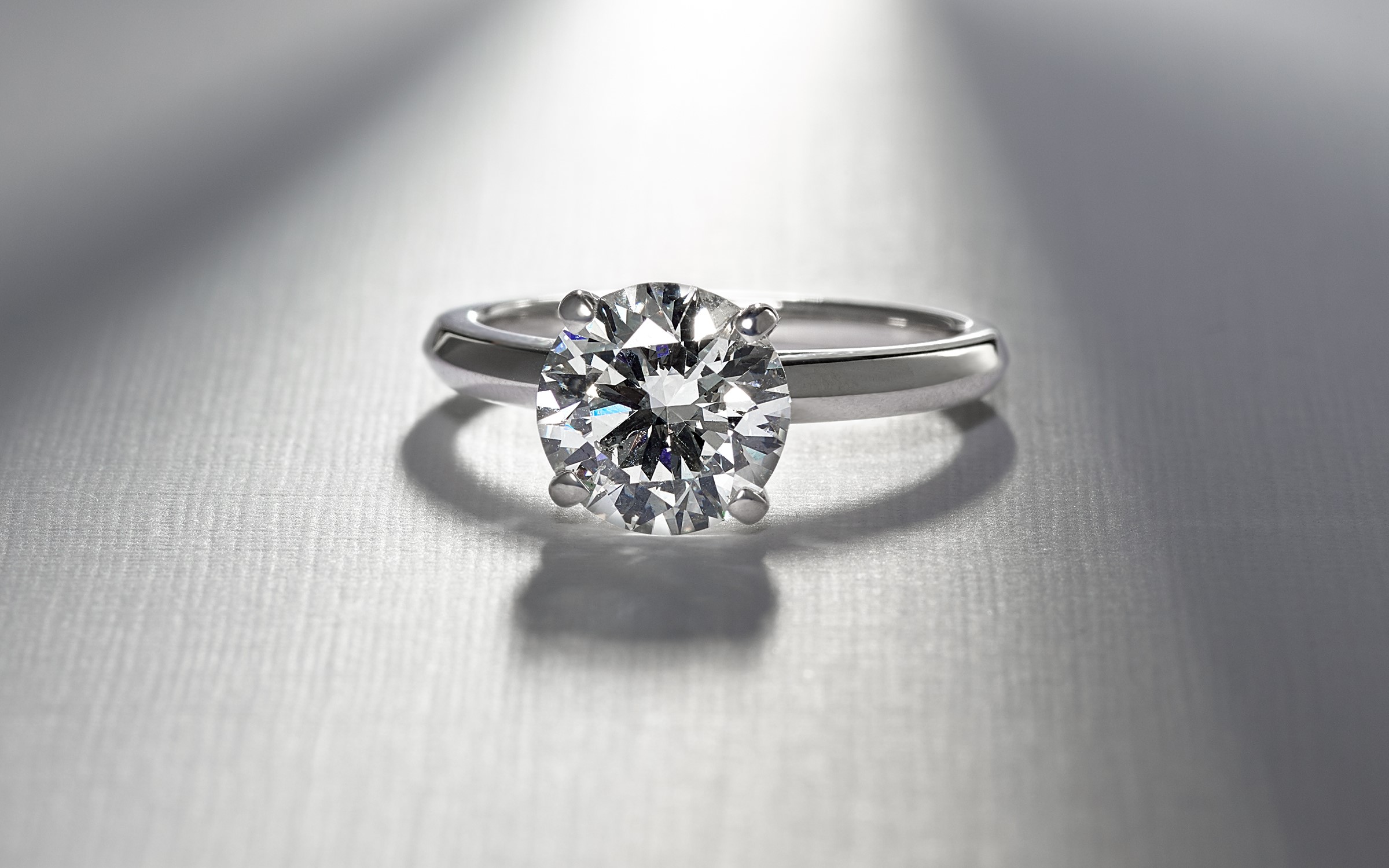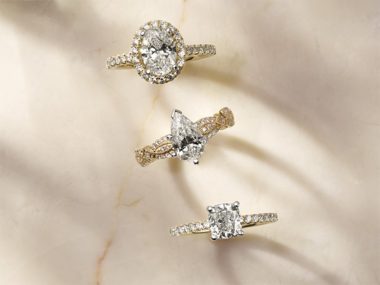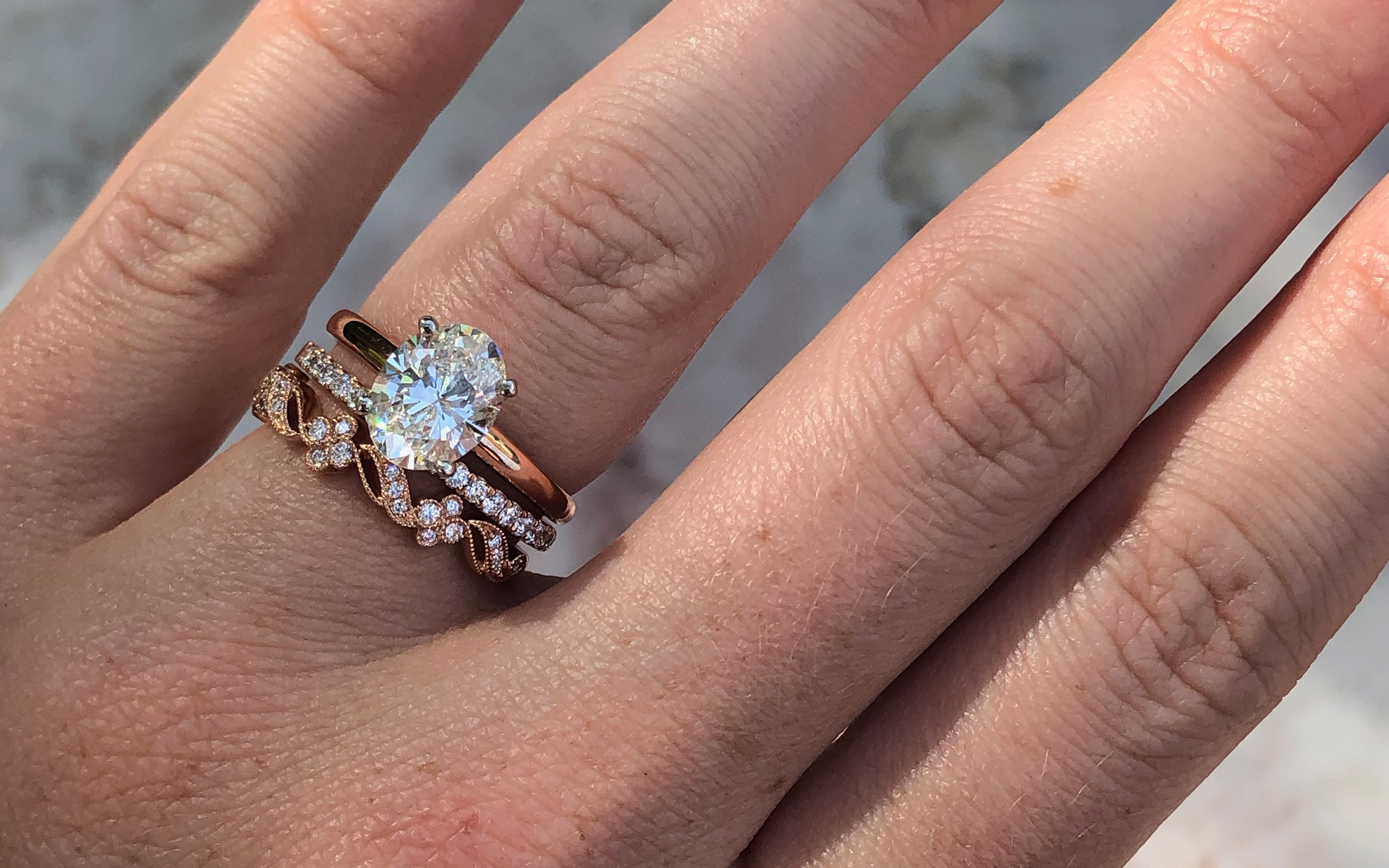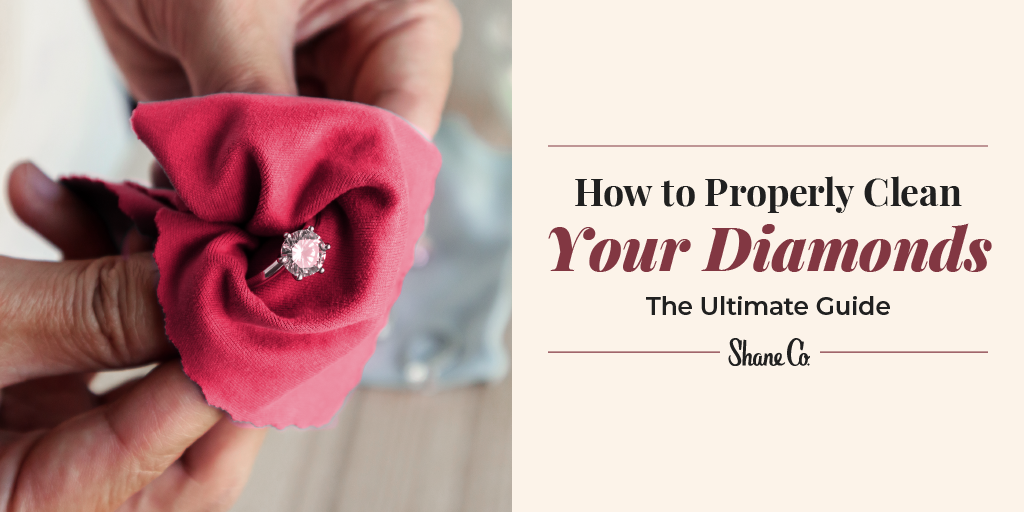
It’s true what they say — diamonds are forever. They’re one of the hardest substances on Earth, ranking a 10 on the Mohs scale of mineral hardness. They also symbolize our unbreakable bond of love and commitment, sentiments that we hope to share forever with our better half. And yet, you might find that the inevitable passage of time erodes the once pristine brilliance of your diamond.
Don’t worry, this is completely normal and doesn’t foreshadow any trouble in the department of love. Instead, it simply means your diamond needs a good cleaning to restore its blinding fire.
Why Should You Clean Your Diamond?
Although diamonds themselves are nearly indestructible, their brilliant shine is more fragile. But to understand why you should clean your diamond, you first should understand why they shine so brightly.
Diamonds get their fire from phenomena of light — reflection and refraction. At any given moment, light is cast down on your diamond. Some of that light immediately bounces back off of its surface, which is called reflection. The rest travels through the diamond, bouncing — or refracting — off of its carefully crafted facets and back through the top toward your eye. This creates the fiery shimmer diamonds are known for.
Over time, oil from your fingers transfers to the gemstone’s surface and creates the perfect environment for dust and dirt to collect. This makes the surface more opaque or cloudy, blocking out precious light and reducing its refraction. The result is a duller appearance. But how often do you need to restore your diamond’s natural shine?
How Often Should You Clean Your Diamond?
A diamond should be cleaned regularly to maintain brilliance and fire. In fact, we recommend various levels of cleaning at various intervals to keep diamonds looking at their best. For best results, clean your diamonds at the following intervals:
Daily. For daily touch-ups, it’s perfectly safe to wipe down your diamonds with a soft, lint-free microfiber cloth. Just don’t rub too hard or use anything that could scratch metal or leave unwanted fibers stuck underneath prongs or fittings.
Semi-monthly. As dirt and debris collect on your diamond over the course of weeks and months, give the stone a more thorough cleaning. Aim to accomplish this every two months. There are a variety of DIY ways to safely clean your diamond and some that can cause harm. We will cover all of this and more later in this guide.
Semi-annually. Every six months, we recommend having your diamond cleaned professionally for optimal head-turning brilliance. At Shane Co., we offer free cleanings in-store to make it easier for our customers to show off their rocks year-round. Along with restoring that pristine shine, a knowledgeable gemologist will check for loose stones and bent prongs and ensure your piece leaves our store in great condition.
So how do you spruce up your jewelry in between professional cleanings? Keep reading to learn the ins and outs of cleaning diamonds at home.
Diamond-Cleaning Mistakes to Avoid
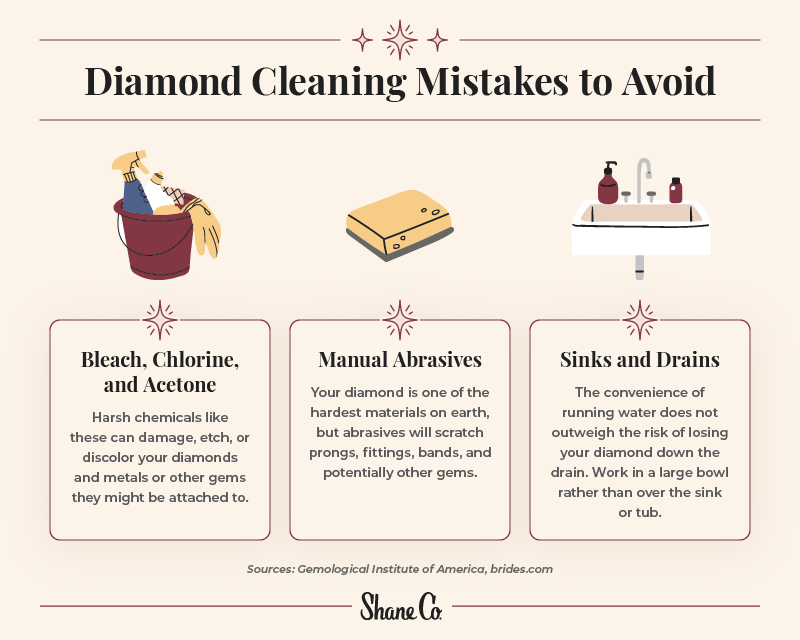
Don’t scrub your diamond with the nearest chemicals and abrasives. Yes, it’s easy to assume that due to its stalwart composition, a diamond can handle the harshest suds in your cleaning closet. However, this could not be further from the truth.
1. Don’t use bleach, chlorine, or acetone. It is imperative that you keep your diamond jewelry far away from this harmful chemical trio, according to the Gemological Institute of America. While the stones themselves might survive unscathed, these harsh chemicals can erode precious metals, worsening the overall look of the piece or allowing the diamond to fall out of its setting, never to be found again.
2. Don’t use manual abrasives. The main problem with using abrasive materials to clean your diamond, again, is the damage they can cause to any metal rings or fittings. As brides.com reported after interviewing Mark Mann, director of Global Jewelry Manufacturing Arts at GIA, abrasive products like toothpaste, baking soda, or powdered cleaners will easily scratch gold and other precious metals.
3. Don’t work next to a sink or drain. No, seriously. Just don’t do it. It’s no use playing the hero and thinking that you definitely won’t be that person who drops their diamond down the drain. And yet, it’s happened to the best of us and simply is not worth the risk. A large serving bowl filled with water is a much more suitable environment for your diamond-cleaning needs.
How to Clean Your Diamond Properly
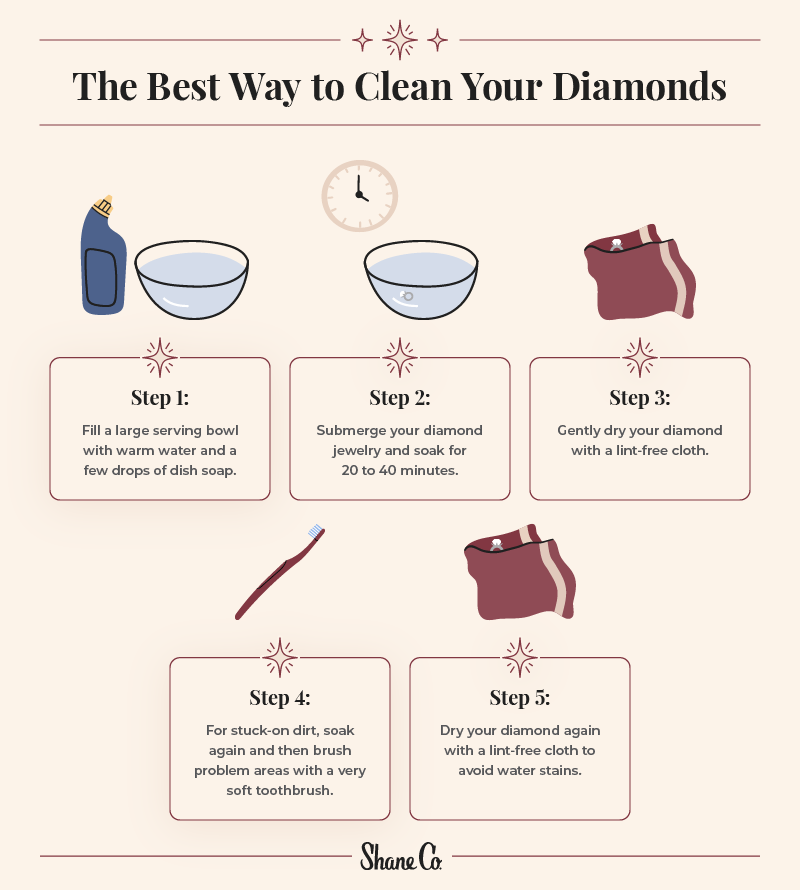
Now that you know what not to do, let’s cover the best ways to clean your diamond at home. There are several popular schools of thought as to the best process and we will go over the pros and cons of each.
1. Use a gentle degreaser. The best way to clean your diamond at home is to bathe it in a gentle degreasing solution such as warm water and regular dish soap. Allow the diamond to sit in this bath for 20 to 40 minutes to loosen dirt particles and finger oil. Then retrieve the piece of jewelry and wipe it down with a lint-free dishcloth or microfiber towel.
If stuck-on dirt remains, particularly in the grooves where diamond and prong meet, you might need to employ a toothbrush with very soft bristles and gently brush the problem areas. Be especially careful when brushing antique jewelry or a tension setting where the diamond is being held in place by pressure alone.
Then, rinse off the diamond again (not near the sink!), assess your progress, and if satisfactory, pat dry once more with the lint-free towel of your choice. Diamond jewelry should not be allowed to air dry in order to avoid water stains.
2. Use a formulated cleaning solution. Store-bought solutions are another incredibly cheap option, but slightly riskier. Unlike over-the-counter household cleaners, these are specially designed to be safe on jewelry. However, you need to read the label to ensure you have the right product for the job.
For instance, some solutions are formulated for specific jobs or metals, such as Connoisseurs Silver Jewelry Cleaner, which targets tarnish on silver. For diamonds, you’d want to go for their Fine Jewelry Cleaner instead. Choosing the wrong cleaner still could lead to damage if you’re not careful.
3. Use a steam cleaner. Steam cleaning is an effective albeit pricier process for restoring shine to your diamonds. This method uses pressurized steam to rid jewelry of grease and grime without resorting to harmful chemicals. It’s safe for precious metals as well as diamonds and other gemstones. Plus, they have the added benefit of killing bacteria in the process!
Some considerations are whether the size of the holding cup is large enough for your jewelry and which cleaning modes are available. You’ll want to match the cleaning mode and cleaning solution to the condition of your jewelry. Plus, if you have especially tarnished or blackened pieces, a steam cleaner might not have the chops to clean them fully.
4. Use an ultrasonic cleaner (proceed with caution). Ultrasonic cleaners work by sending sonic micro-vibrations through liquid (usually water or a gentle cleaning solution) to jostle free dirt and residue stuck to the surface of the piece. This is a very effective way to clean diamonds and is common practice for trained professionals. However, it can be risky when tried at home.
Even consumer-grade ultrasonic cleaners produce a brilliant result, but the risks often overshadow the rewards. If you’re cleaning jewelry with fragile diamond settings, they can knock stones loose and cause more harm than good. The vibrations can cause diamonds to become loose or break free.
If you use an ultrasonic cleaner, be judicial when selecting appropriate pieces for the method. Anything with pavé stones or delicate settings should be left out of the question. If your stone has a lower clarity grade or has been treated by a non-permanent method to attain its color, it is not suitable for ultrasonic cleaning either. Check the diamond’s grading report to be sure. While Shane Co. never treats its stones to enhance their color using non-permanent methods, some less reputable jewelers do. If your stone didn’t come from Shane Co., it may have been treated to enhance its color by a method other than heating with beryllium, and putting such a stone in an ultrasonic could remove its enhanced color.
Keeping Diamonds Clean and Safe Care Practices
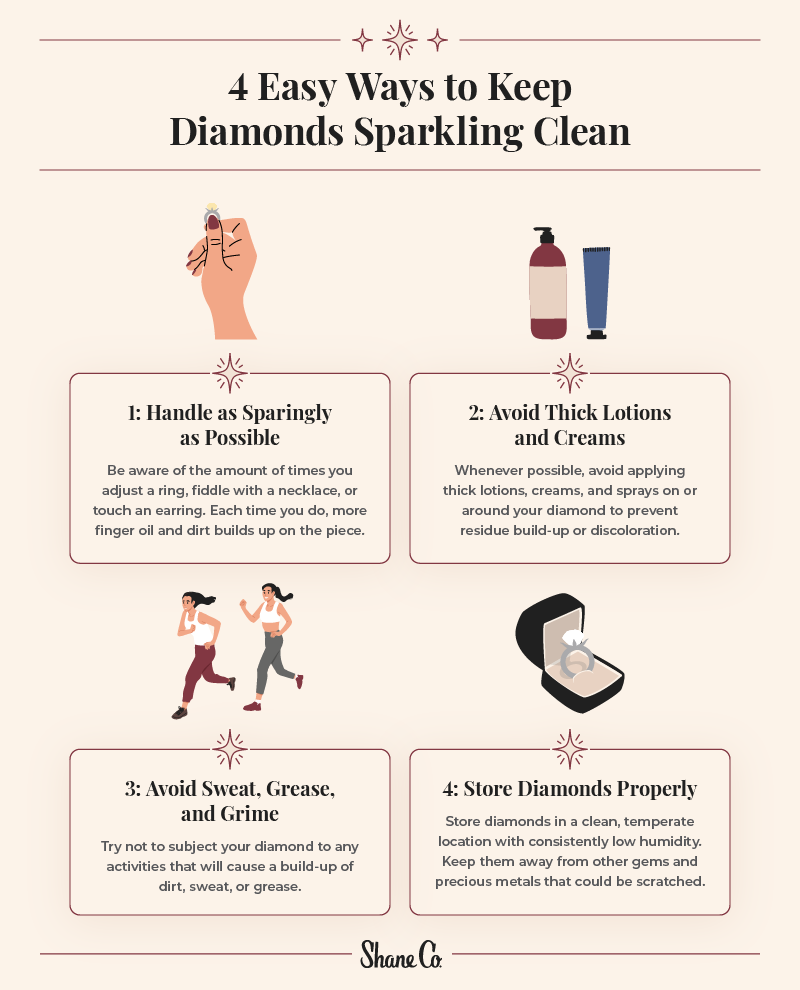
So you already have your diamonds professionally cleaned twice a year, clean them yourself every other month, and wipe them down daily, but dirt and grime still cloud their brilliant shine? Don’t worry, all hope is not lost. Here are some lifestyle alterations that can help your diamonds shine on.
1. Handle as sparingly as possible. This one seems obvious, but it’s sort of like avoiding touching your face when you’re sick. Many jewelry owners subconsciously adjust a ring, fiddle with a necklace, and otherwise touch their diamond jewelry constantly without even realizing it. And each time they do, they deposit finger oil that attracts more dirt. Try to be aware of this bad habit and kick it for a longer-lasting diamond sparkle.
2. Avoid thick lotions and creams. Whether you’re applying sunscreen before a day at the beach or hairspray before a night on the town, this is an excellent time to remove your diamond ring. In general, you should avoid applying thick lotions, creams, and sprays on or around your diamond to prevent residue build-up or discoloration.
3. Avoid sweat, grease, and grime. Your diamond doesn’t have bills to pay or mouths to feed, so leave it off your finger when doing manual labor or cooking! There is no sense in subjecting your diamond to any activities that will cause a build-up of dirt, sweat, or grease.
4. Store diamonds properly. A key to keeping your diamonds in good condition is proper storage. Here’s how to keep your diamonds (and other jewelry) safe while not in use.
- Avoid extreme temperatures and humidity. Admittedly, this one is more for the precious metal that your diamond is likely attached to. Nevertheless, high humidity and temperature extremes can tarnish or discolor jewelry. Store your diamond jewelry in a temperate place with consistently low humidity.
- Store your diamonds away from other jewelry. Because they rank a 10 on the Mohs scale of mineral hardness, they can scratch every other material in your jewelry collection. That’s why it’s best to store them away from other gemstones — and even each other. Instead, store them in their original box, a felt-lined compartmentalized jewelry box, or wrapped in a microfiber cloth.
- Store away from dirt and corrosion. A dusty old heirloom box is not the best place to store your diamond jewelry. Equally important, that smelly, tarnished pawn shop find doesn’t belong next to your grandma’s wedding ring. The smell, and even corrosion, could transfer over to the priceless piece. Instead, keep your jewelry in a clean and well-maintained space.
Final Thoughts
There you have it. You are now fully equipped to take care of your diamond jewelry for unending enjoyment. And remember, our free lifetime warranty covers every aspect of your jewelry, including the center stone. That means we will take care of you even if you do lose a few pavé stones during an ultrasonic cleaning tragedy. But if you still have questions about how to clean your diamond, refer to our FAQs below.
Frequently Asked
How can I make my diamond shiny at home?
The best way to clean a diamond at home is to put it into a bath of warm water and a few drops of dish soap. Let it soak for 20-40 minutes and wipe it dry with a lint-free cloth. If stubborn stuck-on dirt remains, repeat the process but scrub the ring gently with a soft-bristled toothbrush this time.
Can you clean diamonds with vinegar?
Yes and no. Vinegar will not harm diamonds themselves as they are impervious to acids. However, it will harm other semi-precious stones as well as any metals with a copper alloy like rose gold. Since vinegar is temperamental with some materials likely to be found in your jewelry box, it’s best to avoid this solution altogether.
Is it OK to clean diamonds with toothpaste?
No, it isn’t safe to clean diamonds with toothpaste. The abrasive grit will cause harm to any metal settings, rings, or chains.
Can I use Windex to clean my diamond ring?
According to The Knot, Windex is benign enough to be used on diamonds in a 50/50 solution with hydrogen peroxide. Still, though, we recommend not taking any chances with household cleaning products that could potentially damage your stone or ring.
Why does my diamond look cloudy?
Over time, finger oil builds up on your diamond’s facets through regular use. Dirt then sticks to the oil, causing a dull, cloudy appearance. In this case, simply cleaning the rock will suffice. If the cloudy look isn’t replaced by shine after a good cleaning, it could be a permanent affliction caused by inclusions (or defects) in the stone itself.
